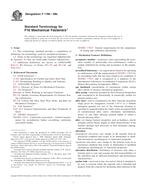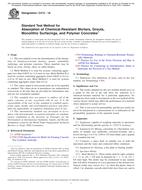1.1 These test methods provide procedures for stressing photovoltaic modules in simulated temperature and humidity environments. Environmental testing is used to simulate aging of module materials on an accelerated basis.
1.2 Three individual environmental test procedures are defined by these test methods: a thermal cycling procedure, a humidity-freeze cycling procedure, and an extended duration damp heat procedure. Electrical biasing is utilized during the thermal cycling procedure to simulate stresses that are known to occur in field-deployed modules.
1.3 These test methods define mounting methods for modules undergoing environmental testing, and specify parameters that must be recorded and reported.
1.4 These test methods do not establish pass or fail levels. The determination of acceptable or unacceptable results is beyond the scope of these test methods.
1.5 Any of the individual environmental tests may be performed singly, or may be combined into a test sequence with other environmental or non-environmental tests, or both. Certain pre-conditioning tests such as annealing or light soaking may also be necessary or desirable as part of such a sequence. The determination of any such sequencing and pre-conditioning is beyond the scope of this test method.
1.6 These test procedures are limited in duration and therefore the results of these tests cannot be used to determine photovoltaic module lifetimes.
1.7 The values stated in SI units are to be regarded as standard. No other units of measurement are included in this standard.
1.8 This standard does not purport to address all of the safety concerns, if any, associated with its use. It is the responsibility of the user of this standard to establish appropriate safety and health practices and determine the applicability of regulatory limitations prior to use.
Product Details
- Published:
- 04/01/2009
- Number of Pages:
- 4
- File Size:
- 1 file , 94 KB
- Redline File Size:
- 2 files , 170 KB


